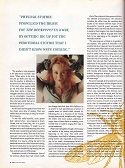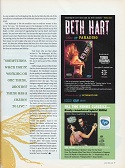|

songs | interviews | photos | tours | boots | press releases | timeline
Relix (US)
April/May 2005
In the Garden of Amos
Tori Amos Digs Deep
By Robert L. Doerschuk
The fields of Cornwall surround the house where Tori Amos lives. Deep green, dotted with wildflowers, they bear the scent of the sea from over the high cliffs and back to her, and to her husband, Mark Hawley and their four-year-old daughter Natashya Lorien, and to the garden they've planted just down the hill. They grow their vegetables there, marking the changes of the season through cycles of sowing and nurturing and collecting and then shutting down as the gentle winter settles over southwestern England.
It's a functional garden, governed by nature. After moving in -- Mark, having spent idyllic childhood summers here with his family, insisted on returning to this seclusion -- Tori learned about what would grow and what wouldn't, working her enlightenment into a schedule that included writing and recording her eighth album, The Beekeeper, in Martian Studios, their home recording space, and co-writing her first book, Tori Amos: Piece by Piece, with her collaborator, the journalist Ann Powers. And now it's a part of their life, as their chef gets into his little Toyota each day and drives down to pick whatever he needs for the kitchen that evening.
"The weather is a big character in the play that is Cornwall," says Amos. "When you're in the cities you just go about your day, but here the weather is definitely in the driver's seat. We're pretty close to the coast, where people would go out with their lanterns and shine their lights to show the smugglers where to come in. There are no streetlights. Sometimes you're forced indoors for days at a time. You learn pretty fast not to think that you're in control of it... because you're not."
But this isn't the first garden from which Tori has drawn some sliver of wisdom. There was another that she once kept, far away, for very different reasons.
"It was this really beautiful, exotic garden that I planted when I was pregnant in Stuart, Florida, with my friend Meg, who is a garden architect," she remembers. "It taught me a lot and gave me so much understanding about what kind of mom I wanted to be and what I needed to do to nurture as a mom. Then two of the hurricanes got it last year -- just one of those things. The physical storms propelled the music for The Beekeeper in a way, by setting me up for the emotional storms that I didn't know were coming. But we were lucky that no one was hurt. And, yes, you have to be thankful for any blessing that you have, and we have a lot of blessings."
Gardens are a motif in The Beekeeper. Some of her previous albums have had central motifs, too: Strange Little Girls, from 2001, fashioned as an answer to male apprehensions of women in popular music, or Scarlet's Walk, released the following year as a chronicle of her travels through America and, metaphorically, stages of life. Others were more random collections of songs, some of them elusive in meaning, some brutally clear on subjects ranging from rape to sexual awakening.
What's tied it all together, though, is the honesty and emotion of her writing and performance. Beginning in the early '90s with Little Earthquakes, Amos built a following, primarily young women who responded in some primal way to her music. Accompanying herself on piano, sometimes playing solo with an occasional pre-recorded rhythm track, the keyboard pushing against her vocal like an urgent tide, she drew from Joni Mitchell and other confessional antecedents but created a style of her own, marked by candor, neurosis, poetry and fearlessness.
Most of these elements have grown with time. The affected pronunciations, the seductive melodies, the slither from the rumbling dark depths to the delicate bell-like highs of her Bosendorfer Imperial grand permeate The Beekeeper. And some of her old demons continue to speak in these songs as they have throughout her repertoire, in Biblical language that harks back to her upbringing as the daughter of a Methodist minister.
"The new songs are a tribute to six gardens," she explains. "The garden of sinsuality is the world in which our character lives. So instead of the Genesis story, where the God says, 'If you eat from the fruit of the tree of knowledge, then you'll be exiled,' His mother Sophia says to our character -- let's call her Tori -- 'if you don't eat from the tree of knowledge, then you will be exiled.' Once she eats this fruit she begins to experience the possible permutations that a relationship may have. These relationships can be with a -- quote, unquote -- 'lover,' or they can be with friends, with mother, daughter, father, brother, stranger/not stranger, et cetera. The possibilities that exist in relationship are within all these songs."
We are, for example, all of us involved in a new relationship these days, with the enigma that we identify by the word "terrorist." "I was curious about this idea," Tori says. "It's been painted in a certain way, especially as the elections were upon us. When you look around, with the war, the picture of the terrorist changed. If you're in one part of the world, the terrorist is an army person from America. If you're in our part of the world, then it's somebody with a turban. So I couldn't resist the temptation to undress this word and to really look at the idea of when we feel invaded. My daughter can feel invaded on the playground by another girl. That can take over her life; it's real to her, much more real than a guy in an army outfit or a turban. Whatever it is, I found the face next to the word 'terrorist' changing as I went through these feelings."
Thus the track in question, "The Power of Orange Knickers," queries, sensibly once you understand the context, "Who is this terrorist? This girls that smile kindly, then rip your life to pieces..."
Shadows as well float across The Beekeeper, like clouds before the deluge. Last fall her mother suffered a heart attack. Luckily, Tori's sister, a physician, got her to the hospital in time to survive a flatline episode and work her way back to recovery. But then, on November 22, came the news that Tori's brother Michael had been killed in a car accident. As if anticipating this, she had written the title cut of the new album as a meditation on life and death; heard now, its lyrics seem prescient.
"The beekeeper is like the medicine man or medicine woman of this story," Tori says. "My character goes to the beekeeper to find out how to keep her mother alive, because the beekeeper is able to hook me up with Death. Is there some kind of negotiating that can be done? And Death speaks: 'Do you know who I am? I'm the one who taps you on the shoulder when it's your time.' That drew me into the idea that when she says, 'Maybe I'm passing you by, but don't be confused -- one day I'll be coming for you,' that means we can't explain why some of us are left here and some of us aren't. It's about the infinity dance that bees do to show where the flowers are that carry the nectar. That's very much a part of the bee master tradition, the ideas of continuum and infinity.
"And that's why you hear about Michael in 'The Beekeeper.' It's like, 'Take this message to Michael: Even though you might pass on from this life, you're still a part of this infinity dance.'"
Oddly enough, Amos credits the fact that her book clamored for attention throughout the Beekeeper sessions for the quality she was able to achieve in her music. "I was concentrating so much on the book that the music was allowed to live," she says. "You can change a song and change a song until you say, 'Where am I?' I'm into rewrites but I had to spend so much time on the book that music became my hobby. Believe it or not, there was more pressure on me to make Scarlet when I went to Epic. I didn't have anybody bearing down on me this time. The book -- it's my first and probably my last -- was the pressure. Because of it I went to the piano and the organ, closed the door, and just played music for hours. Sometimes, when you're working on one thing, another thing has a chance to live."
Over the horizon, back in the States, the media whirlwind was stirring as we spoke: book signings, Letterman, solo concerts, all being booked... For the moment, though, there are other priorities to consider.
"We're working on the idea of lavender here," Tori muses, looking toward the unseen sea. "We're experimenting with different lavender plants. I'd love to grow the oils of lavender in high quality. I'd love to have a lavender farm. Someday."
original article
  
[scans by Richard Handal]
[transcribed by jason / yessaid]
t o r i p h o r i a
tori amos digital archive
yessaid.com
|